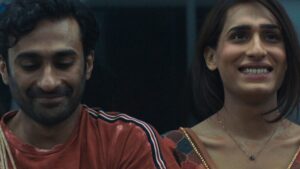
Cineworld Cardiff
Mawrth 2023
“What’s good guys, I’m Chris. I’m 22 and I study Cinema at USW. This proved to be an eventful cinema trip to say the least, and I’m happy to deduct that this film has become one of my favourites from 2022. The controversial Joyland, directed by Saim Sadiq, is a deep yet necessary look into the family and relationships of a young man named Haiden. He struggles with the lack of approval from his traditionalist Islamic father, who wishes he gets a job to support his already employed wife, Mumtaz. Further, his attempt at juggling both a healthy relationship with home, and a newfound infatuation with the transexual dancer, who employs him as a background dancer in the local erotic dance theatre, ascends into dire consequences.
As I sat in seat K17, central to the auditorium, about 10 minutes passed before an intervention was made due to the absence of subtitles. I was indefinitely worried I would have to find a new film to watch and review, as I had been eagerly looking forward to this seemingly enticing and genuine plot. Alas, the staff hastily rebooted the software and reran the beginning of the film, and we were away.”
Cineworld Cardiff is a venue I would recommend to any young person interested in film due to their interesting curation of international and British independent film, of course mixed with those guilty pleasure blockbusters; I have had my unlimited membership for coming up to a year now.
“The film begins slowly, as it constructs the situation of a traditionalist family in Pakistan. It makes painfully clear the effects on young adults living under these conditions in a modern society throughout the narrative, firstly by outlining the scaffolding of our protagonist Haiden. Although unexciting, his reaction to blood and inability to enact his father’s wishes of violent execution prove Haiden’s fragility in a way imperative to understanding his actions throughout. Joyland challenges these established classical conventions excellently, placing the happiness of the spotlight couple, Haiden and Mumtaz, in the context of a stay-at-home husband and a full-time working wife. The introduction of transsexuality in a rightly humanised manner further elevates this contemporary narrative.”
Alina Khan as Biba proves a brave, brilliant performance. As someone who would have faced the backhand of hatred due to her transsexuality in Pakistan, the clear emotion within her character escalates further an understanding of a social group viewed as outcasts in the country’s society.
“There has been much tension around the themes in the Joyland narrative, with the film being banned in Pakistan, re-cut for re-release, and then banned once again. The mythology behind the Hijra/Khusra has been known for centuries in Pakistan and so it has been commonplace in their culture, yet, it has still been shunned for many years. Sadiq’s choice of the erotic dance theatre as a primary location is key in his exploration of, as he puts it, ‘…the contradiction that exists and everyone seems to be okay with.’ He goes on to talk about the contrast between the events inside the erotic theatres, and the desire seemingly left behind when the curtains close. This exploration of acceptance within the ‘time and place’ idiom allows for a rich argument in favour of an embrace from a wider societal standpoint.
A character arc I found myself increasingly involved in was that of Mumtaz; her growing intolerance of the life she has found herself stuck in becomes increasingly tense, as she uses different coping mechanisms that never satisfy her longing for release. Rasti Farooq submits a harrowing performance, shedding light on the pressures of traditional Islamic expectations of the female. A particular standout scene is where she plays tag with the children of the household on Father’s birthday and refers the viewer to her ongoing internal struggles as they externalise and become apparent, through Mumtaz laughing destructively as she reaches the end of her tether. Her apparent exclamation of joy proving the contrasting factors.
Joyland is potent and thoughtful in reviewing the societal norms of Pakistan, through the eyes of a man who never felt he fit into them. His contrasting values with that of the Pakistani government create a powerful tale of love, growth, and loss. Sadiq’s use of an ensemble cast wonderfully creates a realistic atmosphere with attentive characters, in whose stories I was ever engrossed. We’re all just trying to find joy, a place to fit in; within Joyland, I found that comfort.”
Watch the trailer for Joyland
Find more films screening at Cardiff Cineworld
Download Chris’ review as a PDF: Joyland Review Chris Davies USW Cineworld



